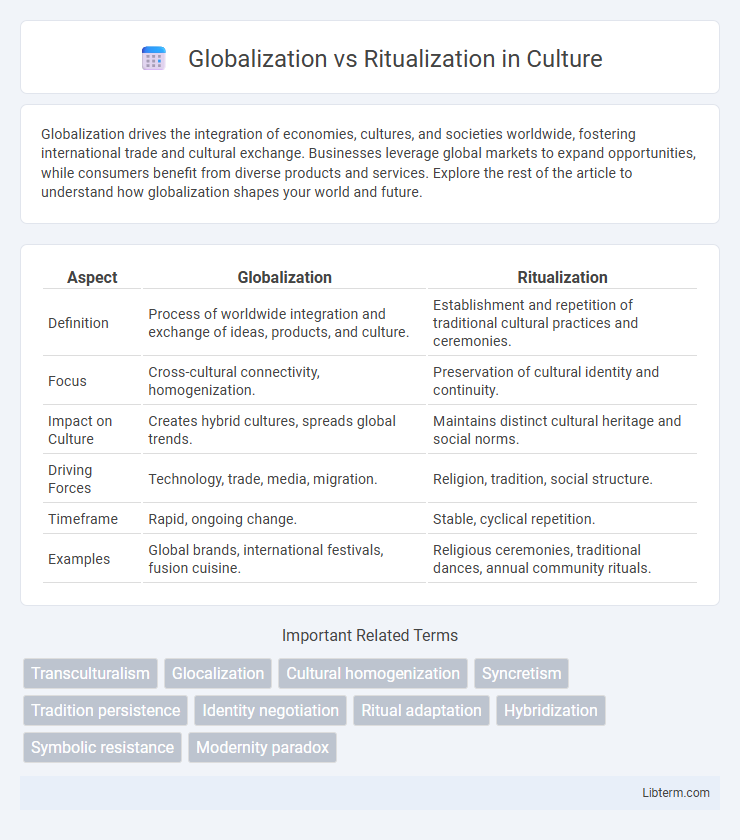Globalization drives the integration of economies, cultures, and societies worldwide, fostering international trade and cultural exchange. Businesses leverage global markets to expand opportunities, while consumers benefit from diverse products and services. Explore the rest of the article to understand how globalization shapes your world and future.
Table of Comparison
| Aspect | Globalization | Ritualization |
|---|---|---|
| Definition | Process of worldwide integration and exchange of ideas, products, and culture. | Establishment and repetition of traditional cultural practices and ceremonies. |
| Focus | Cross-cultural connectivity, homogenization. | Preservation of cultural identity and continuity. |
| Impact on Culture | Creates hybrid cultures, spreads global trends. | Maintains distinct cultural heritage and social norms. |
| Driving Forces | Technology, trade, media, migration. | Religion, tradition, social structure. |
| Timeframe | Rapid, ongoing change. | Stable, cyclical repetition. |
| Examples | Global brands, international festivals, fusion cuisine. | Religious ceremonies, traditional dances, annual community rituals. |
Understanding Globalization: A Modern Phenomenon
Globalization, a modern phenomenon characterized by the accelerated flow of goods, information, and cultural elements across borders, reshapes economic and social landscapes worldwide. This process hinges on technological innovation, international trade, and communication networks that dissolve traditional barriers, fostering interconnectedness. Understanding globalization requires analyzing its impact on local identities and economies, contrasting with ritualization's emphasis on preserving cultural continuity amidst rapid change.
Defining Ritualization in Cultural Context
Ritualization in a cultural context refers to the structured and repetitive enactment of symbolic actions that reinforce community values, beliefs, and social norms. These rituals serve as a medium for cultural transmission, identity formation, and social cohesion across generations. Contrasting with globalization, which promotes cultural homogenization through worldwide interconnectedness, ritualization emphasizes the preservation and enactment of localized cultural heritage.
Key Differences Between Globalization and Ritualization
Globalization involves the widespread integration of economies, cultures, and technologies across international borders, promoting interconnectedness and exchange on a global scale. Ritualization refers to the repetitive enactment of symbolic actions or customs within specific cultural or social groups, emphasizing tradition and localized identity. The key difference lies in globalization's emphasis on cross-cultural diffusion and economic interdependence, whereas ritualization centers on preserving and reinforcing group-specific meanings and social cohesion through established practices.
The Impact of Globalization on Traditional Rituals
Globalization influences traditional rituals by introducing cross-cultural exchanges that reshape local customs and practices, often leading to the fusion or adaptation of rituals to fit a globalized context. Economic development and digital communication networks accelerate the dissemination of cultural elements, sometimes causing the dilution or commercialization of sacred rituals. However, globalization also fosters ritual preservation through increased awareness and tourism, which can provide communities with incentives to maintain and revitalize their traditional ceremonies.
Ritualization as a Counterbalance to Globalization
Ritualization serves as a powerful counterbalance to globalization by preserving cultural identity and reinforcing local traditions that globalization often threatens to homogenize. Through repetitive and meaningful practices, ritualization fosters community cohesion and affirms distinct social norms amidst the global flow of ideas and goods. This process helps maintain diversity and resists the erasure of localized customs in an increasingly interconnected world.
Cultural Identity: Navigating Global and Local Practices
Globalization accelerates the exchange of cultural elements, challenging traditional identities by blending global influences with local customs. Ritualization acts as a mechanism to preserve cultural identity, reinforcing unique community practices amidst external pressures. Balancing these dynamics enables societies to maintain their heritage while adapting to an interconnected world.
How Technology Shapes Globalization and Ritualization
Technology accelerates globalization by facilitating instant communication, international trade, and cultural exchange through digital platforms, enabling unprecedented connectivity. Concurrently, technology influences ritualization by enabling virtual ceremonies, online communities, and digital preservation of cultural practices, allowing traditions to adapt and persist in modern contexts. The interplay between digital innovation and social behavior reshapes how global and local rituals coexist and evolve in the digital age.
Economic Influences on Ritual Practices Worldwide
Economic globalization significantly transforms ritual practices by introducing global market dynamics that alter traditional resource allocations and consumption patterns during ceremonies. Multinational corporations and international trade impact local economies, often reshaping rituals to incorporate modern goods or services that symbolize status and connectivity. This convergence of economic forces and ritualization fosters hybrid cultural expressions while sometimes diluting indigenous customs due to commercial pressures.
Case Studies: Cultures Adapting Rituals Amid Globalization
Case studies reveal diverse cultural adaptations where globalization intersects with ritualization, such as the transformation of Japan's tea ceremony through the incorporation of global aesthetic elements while preserving traditional practices. In India, Diwali celebrations have evolved by integrating digital platforms for global participation, showcasing a blend of ancient rituals and modern technology. African festivals like the Yoruba Egungun masquerade blend ancestral customs with contemporary influences, highlighting resilience and innovation in maintaining ritual significance amid global cultural exchange.
The Future: Harmonizing Globalization and Ritualization
The future of cultural dynamics hinges on harmonizing globalization and ritualization by integrating global interconnectedness with the preservation of local traditions. Emphasizing adaptability, communities can utilize digital platforms to share rituals globally while maintaining their unique meanings and practices. This balance fosters cultural diversity amid worldwide integration, promoting both innovation and heritage conservation.
Globalization Infographic

 libterm.com
libterm.com